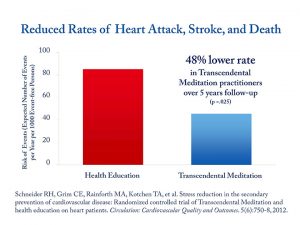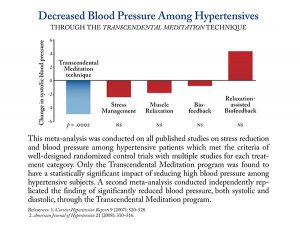The following press release summarizes a scientific statement issued by the American Heart Association and published in the journal Hypertension on April 22, 2013. Clinical trials have shown that practice of the Transcendental Meditation (TM) technique is also associated with lower rates of heart attack and stroke.
FAIRFIELD, Iowa, May 1, 2013—A report from the American Heart Association (AHA) published on April 22 concluded that the Transcendental Meditation® (TM®) technique lowers blood pressure (BP) and states that TM may be considered in clinical practice for the prevention and treatment of hypertension.
 The purpose of the report, entitled “Beyond Medications and Diet—Alternative Approaches to Lowering Blood Pressure: A Scientific Statement from the American Heart Association,” is to inform physicians which alternative approaches to lowering blood pressure have been shown by research to be effective.
The purpose of the report, entitled “Beyond Medications and Diet—Alternative Approaches to Lowering Blood Pressure: A Scientific Statement from the American Heart Association,” is to inform physicians which alternative approaches to lowering blood pressure have been shown by research to be effective.
After considering meta-analyses and the latest clinical trials on different types of meditation, the report stated that while Transcendental Meditation is recommended to lower BP, there is not enough scientific evidence to recommend other meditation or relaxation techniques.
An Important Breakthrough
“This is an important breakthrough in the evolution of medical practice, since it is the first time that the Transcendental Meditation technique has been recognized and recommended for consideration by a national medical organization that provides professional practice guidelines to physicians, healthcare payers, and policymakers,” said Robert Schneider, M.D., F.A.C.C., director of the Institute for Natural Medicine and Prevention who has been the principal investigator for several research studies on the Transcendental Meditation technique and cardiovascular disease. “This type of guideline statement has been what health insurance companies have been requesting for many years.”
The authors of the report assessed three categories of alternative approaches: behavioral therapies such as meditation, noninvasive procedures or devices, and exercise-based regimens. The report did not review diets or dietary supplements.
Part of the impetus for this statement from the AHA came from the patients themselves, who are sometimes reluctant to take medication. “A common request from patients is, ‘I don’t like to take medications, what can I do to lower my blood pressure?’ said Robert Brook, M.D., chair of the expert panel that authored the report. “We wanted to provide some direction.”
Clinical trials have shown that lower blood pressure through Transcendental Meditation practice is associated with significantly lower rates of death, heart attack, and stroke.
Research Confirms Benefits of TM for Heart Health
Meta-analyses referenced in the report found that Transcendental Meditation practice lowers blood pressure on average 5 mmHg systolic and 3 mmHg diastolic. Although, by some accounts, these are modest numbers, Dr. Schneider pointed out that for millions of people with high blood pressure, this reduction may help to bring them into a more normal range or prevent the need for hypertension medication with attendant side effects and costs.
 Clinical trials have shown that lower blood pressure through Transcendental Meditation practice is associated with significantly lower rates of death, heart attack, and stroke.
Clinical trials have shown that lower blood pressure through Transcendental Meditation practice is associated with significantly lower rates of death, heart attack, and stroke.
“We are gratified that our research demonstrating the efficacy of TM on blood pressure is being recognized and hope that this consensus will result in its wider use in clinical practice,” said C. Noel Bairey Merz, professor of medicine at Cedars Sinai Medical Center and principal investigator for an NIH-sponsored clinical trial on Transcendental Meditation and cardiovascular health.
No Harmful Side Effects
The report also recognized that Transcendental Meditation is generally considered safe and without harmful side effects. As an additional advantage, the statement noted that many of the reviewed alternative therapies, such as meditation, may provide a range of health or psychological benefits beyond BP lowering or cardiovascular risk reduction.
The report concluded, “It is the consensus of the writing group that it is reasonable for all individuals with blood pressure levels >120/80 mm Hg to consider trials of alternative approaches as adjuvant methods to help lower blood pressure when clinically appropriate.”


Comments
You May Also Like
Business Success
TM, Creativity, Performance, and Stress, Part 3 | 27:49
Andrew Ross Sorkin of CNBC’s Squawk Box interviews Arianna Huffington and other leading professionals about their personal experience with the TM® technique.
Science & Research
Science, TM, and the Study of Consciousness | 7:13
Follow key research with Dr. Michael Dillbeck, a widely published researcher on the physiological, cognitive, and sociological effects of the TM® technique.
TM in the News
American Institute of Stress: TM Heals PTSD | 7:47
The Dwight D. Eisenhower Army Medical Center Traumatic Brain Injury Clinic at Fort Gordon, Georgia, offers the TM® technique to Service Members and veterans.